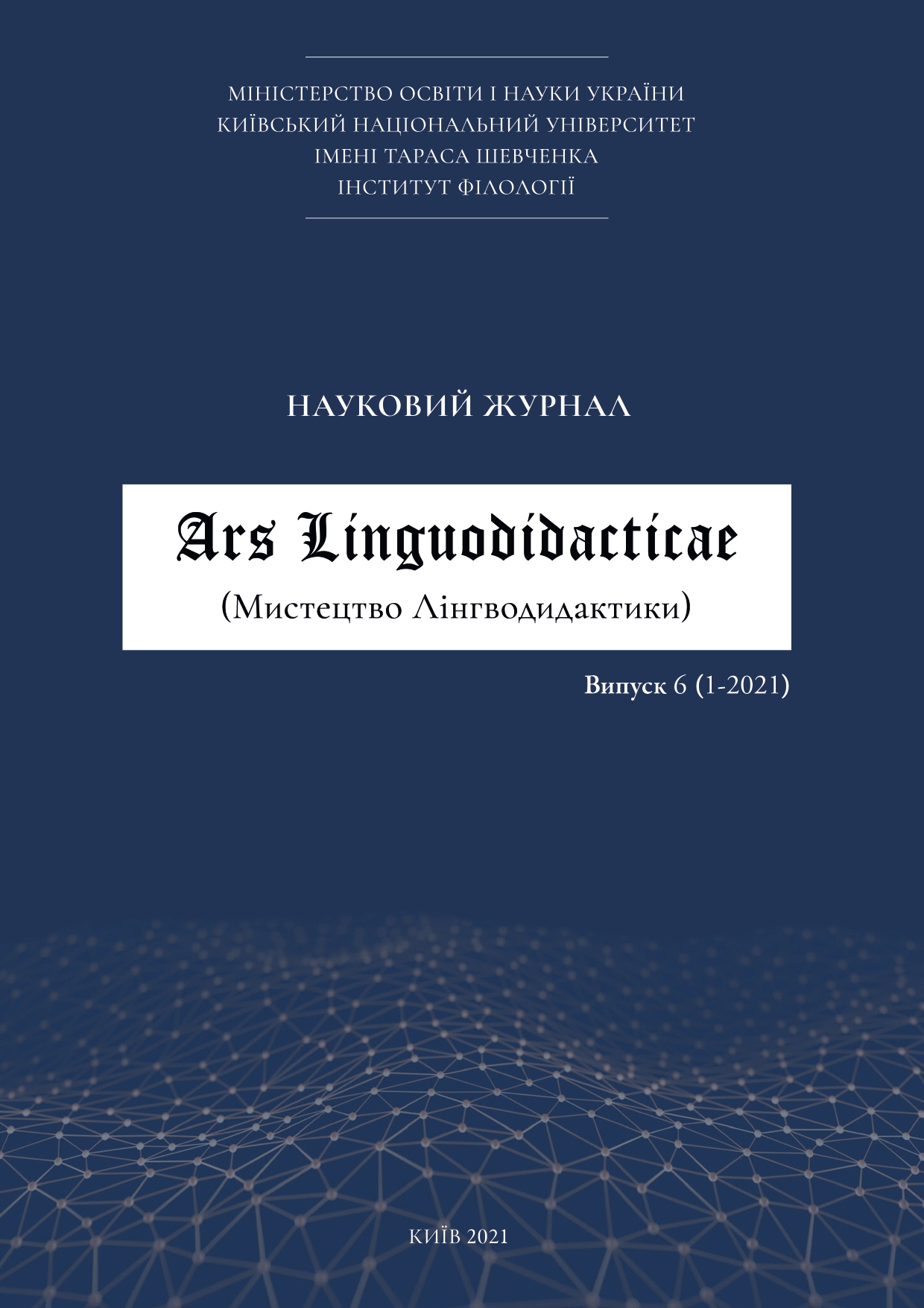ФОРМУВАННЯ ЛАТИНСЬКОМОВНОЇ СОЦІОКУЛЬТУРНОЇ КОМПЕТЕНТНОСТІ СТУДЕНТІВ МОВНИХ СПЕЦІАЛЬНОСТЕЙ: ДОСВІД І ПЕРСПЕКТИВИ
DOI:
https://doi.org/10.17721/2663-0303.2021.6.04Анотація
У статті розглянуто особливості формування латинськомовної соціокультурної компетентності студентів мовних спеціальностей. Проаналізовано наукові розвідки, що окреслюють застосування соціокультурного підходу у процесі навчання латинської мови. На матеріалі практичних занять і власних спостережень розроблено види завдань, що допомагають опанувати дисципліну, викликають зацікавлення студентів до латинської мови та сприяють їхньому всебічному розвитку. З’ясовано, що інтерактивні методи у поєднанні з соціокультурним підходом сприяють активній взаємодії учасників навчально-виховного процесу та є ефективним засобом формування соціокультурної компетентності студентів. Важливу роль на заняттях відіграють метатексти, які з одного боку є розважальним елементом, а з іншого – матеріалом для аналізу лексико-граматичних явищ. Установлено, що завдяки проведенню олімпіад, творчих конкурсів, підготовки презентацій формуються уміння роботи в команді, розкривається творчий потенціал студентів. Підсумовано, що латинська мова є тим предметом, що розвиває інтелектуальні й мистецькі здібності майбутніх фахівців, спонукає до роботи в команді, надихає на творчість
Ключові слова: латинська мова, інтерактивні методи, соціокультурний підхід.
##submission.downloads##
Опубліковано
Як цитувати
Номер
Розділ
Ліцензія
Авторське право (c) 2021 Ірина Борбенчук, Зоя Корнєва

Ця робота ліцензується відповідно до Creative Commons Attribution-ShareAlike 4.0 International License.
Ця робота ліцензується відповідно до Creative Commons Attribution-NonCommercial 4.0 International License.
Політика охорони авторських прав відповідно до умов ліцензії: Creative Commons Attribution-NonCommercial (Атрибуція-Некомерційне використання) 4.0 Міжнародна (CC BY-NC 4.0).
Автори, що публікують свої статті в журналі "Ars Linguodidacticae" (журналі відкритого доступу) зберігають за собою такі права:
- Автори зберігають за собою права на авторство своєї статті та надають журналу "Ars Linguodidacticae" право першої публікації рукопису своєї статті на умовах ліцензії Creative Commons (CC BY-NC 4.0) Attribution License, яка дозволяє іншим особам вільно розповсюджувати опубліковану роботу з обов'язковим посиланням на автора оригінальної роботи та першу оригінальну публікацію в журналі "Ars Linguodidacticae". Інформація про збереження права на авторство надається на титульній сторінці статті.
- Автори зберігають за собою право укладати окремі угоди на неексклюзивне розповсюдження своєї статті у тому вигляді, в якому вона була опублікована в журналі "Ars Linguodidacticae" (наприклад, розміщувати статтю в електронних бібліотеках, архівах та каталогах або публікувати у складі інститутських збірників та монографій), за умови обов'язкового повного посилання на першу оригінальну публікацію в журналі "Ars Linguodidacticae".
- Політика журналу "Ars Linguodidacticae" дає змогу та заохочує розміщення авторами в мережі Інтернет (наприклад в інститутському репозитарії або на персональному сайті) рукопису роботи як до її подання до редакції, так і під час її редакційного опрацювання, оскільки це сприяє продуктивній науковій дискусії та позитивно позначається на оперативності й динаміці цитування статті.
Редакція журналу зберігає за собою видавничі права на:
- зверстані оригінали статей та весь номер журналу;
- оформлення журналу, а також оригінальні ілюстративні та додаткові матеріали;
- репринтні перевидання журналу в друкованому та електронному вигляді.
Політика охорони авторських прав провадиться відповідно до умов ліцензії: Creative Commons Attribution-NonCommercial (Атрибуція-Некомерційне використання) 4.0 Міжнародна (CC BY-NC 4.0).
Для отримання додаткової інформації, будь ласка, прочитайте повний текст Публічної ліцензії CC BY-NC 4.0
Creative Commons Attribution-NonCommercial 4.0 International License.


